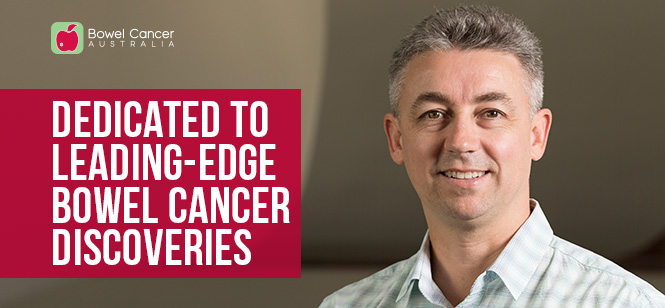Funding from the Colorectal Surgical Society ANZ Foundation will support new research to improve our understanding of why some early stage bowel tumours metastasise to lymph nodes.
“This is important because patients with lymph node disease have worse prognosis and face more intense treatment than patients whose cancer remains within the bowel wall,” said Lawrence Penn Chair of Bowel Cancer Research Professor Mark Molloy.
The $60,000 research grant awarded to the Chair will enable molecular analysis to refine risk of dissemination in early stage tumours and transformation potential of some bowel polyps.
“Patients with Stage I bowel cancer have a greater than 98% 5-year rate of survival which falls to around 70% when the tumour has metastasized to lymph nodes,” Professor Molloy said.
“We need to better understand this process to develop medical interventions and stop the tumour disseminating elsewhere," he added.
The project will generate preliminary data using genomic sequencing of early stage tumours and malignant bowel polyps. Professor Molloy and his team aim to link these mutations with those early tumours which spread to lymph nodes, providing a biomarker of risk which may inform surgical pathways.

The Lawrence Penn Chair of Bowel Cancer Research
Researching a cure for Australia's second deadliest cancer received a major boost recently with $10.4 million to establish the inaugural Lawrence Penn Chair of Bowel Cancer Research at the University of Sydney, launched in May 2018.
Contributing $6.4 million, Bowel Cancer Australia’s funding expanded Australia's research capacity and we anticipate the Chair will be a game changer for bowel cancer research in this country.
While screening can help with early detection, it won't eliminate bowel cancer. Research is the only way to discover a cure.
The Lawrence Penn Chair of Bowel Cancer Research is named after one of Australia's oldest bowel cancer survivors and is based at the University of Sydney's Northern Clinical School, Royal North Shore Hospital’s Campus.
An endowed professorial chair is recognised as a University's finest scholar in their field of expertise. They provide a research focal point in the country they are located, helping to attract and retain the brightest researchers and spur colleagues to their finest efforts - benefiting the entire Australian community.
Professor Mark Molloy is a biochemist and has developed his expertise in the science of 'proteomics'. He is internationally recognised as an expert in the application of mass spectrometry in biomedical research. Professor Molloy’s focus areas are in translational cancer research, biomarker studies and cell signalling.
The commencement of Professor Molloy as the Lawrence Penn Chair of Bowel Cancer Research is the culmination of many years of hard work






